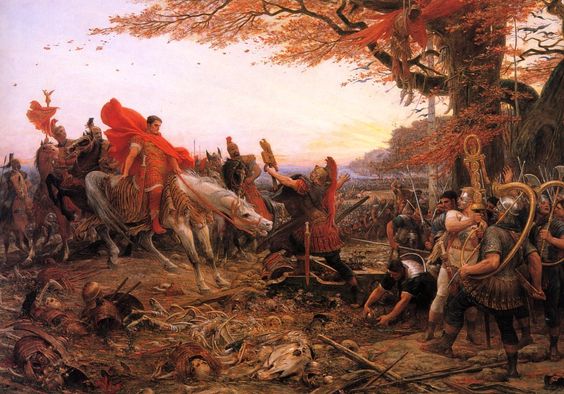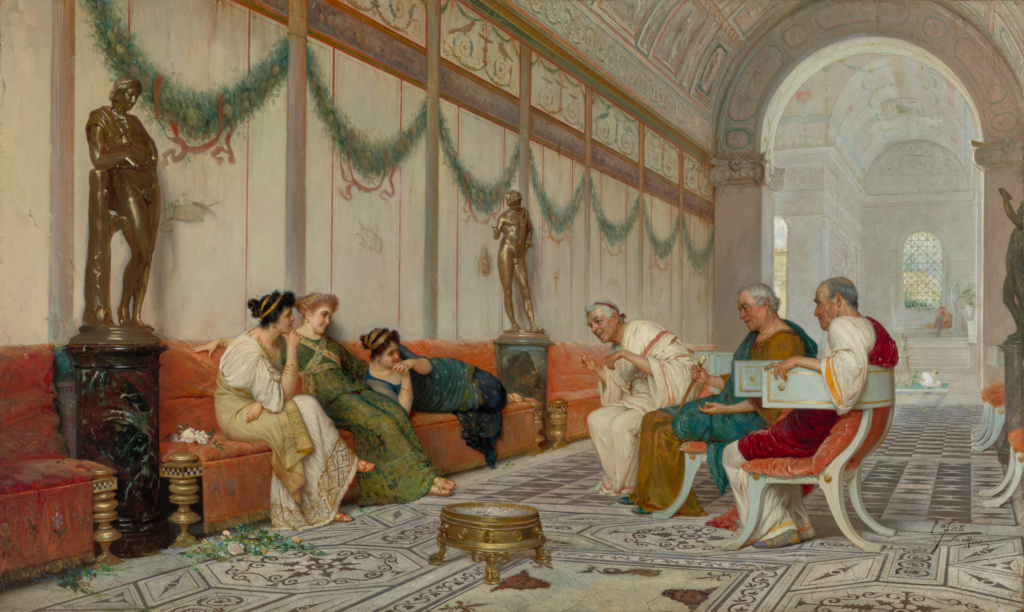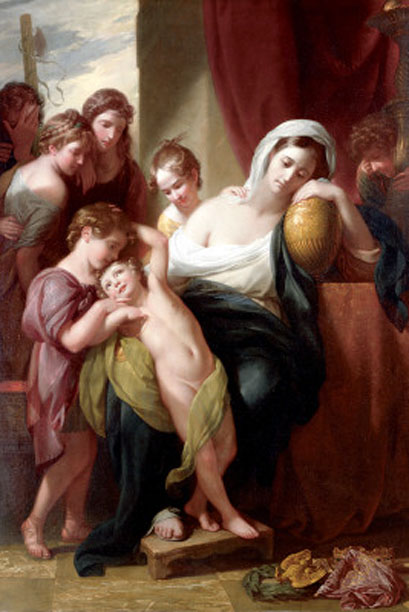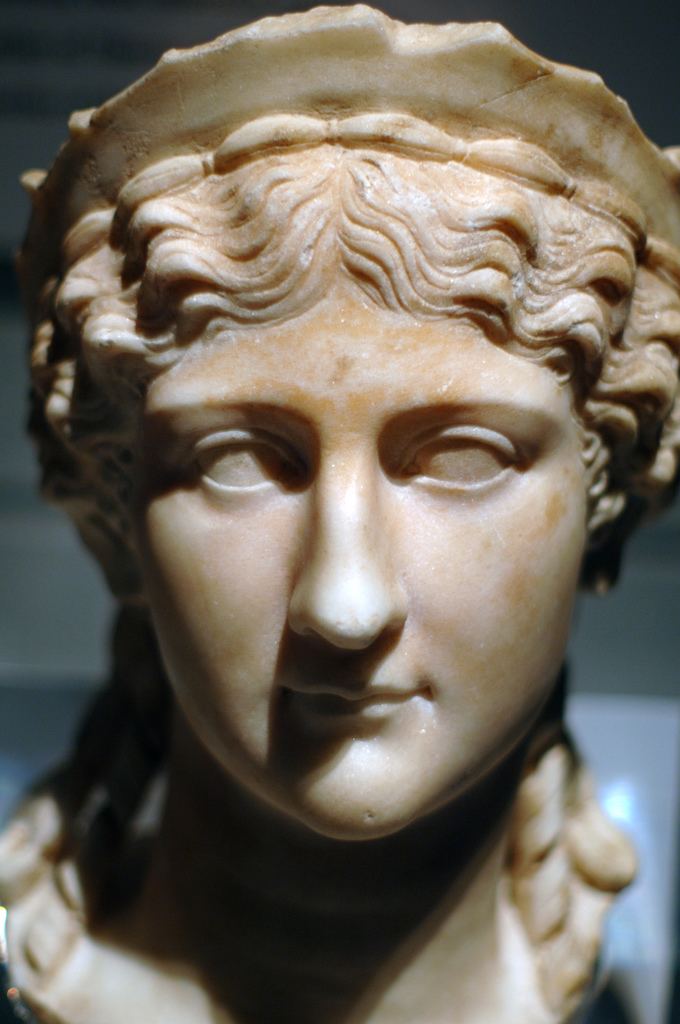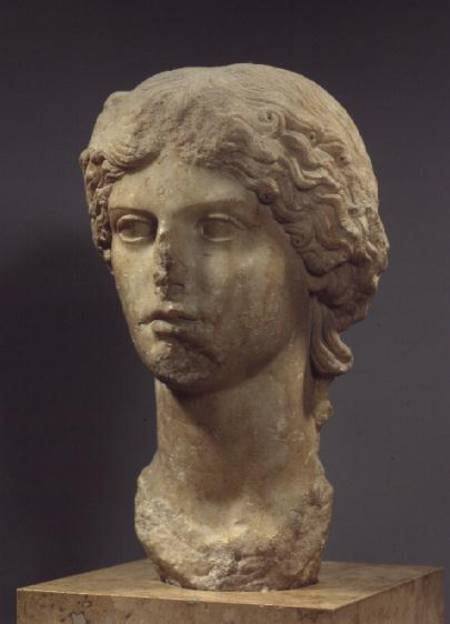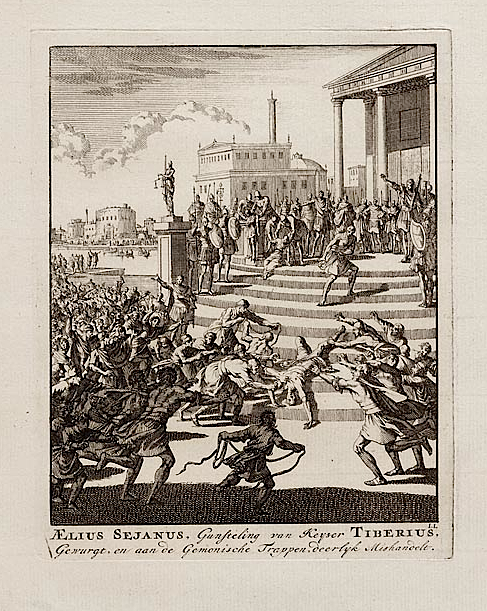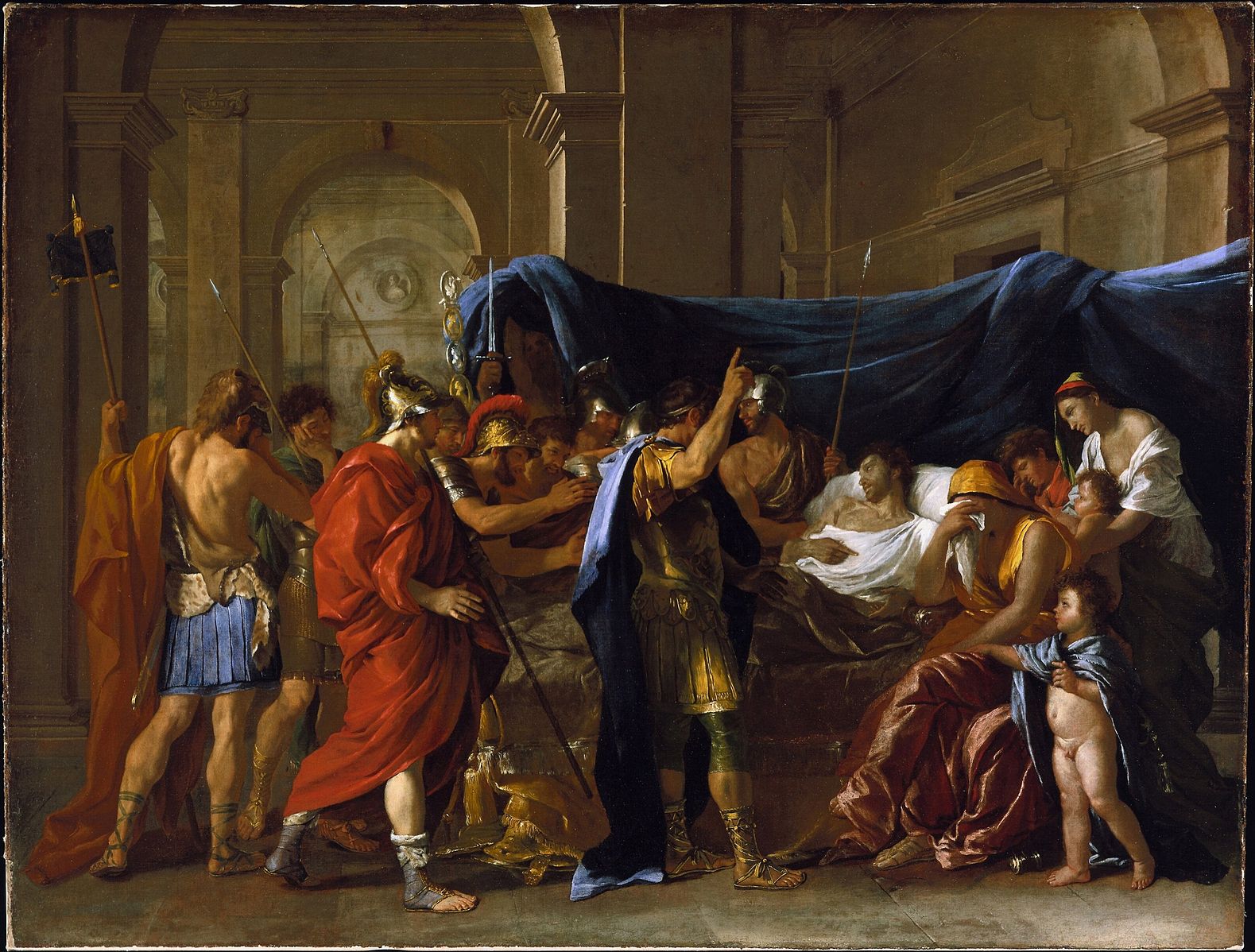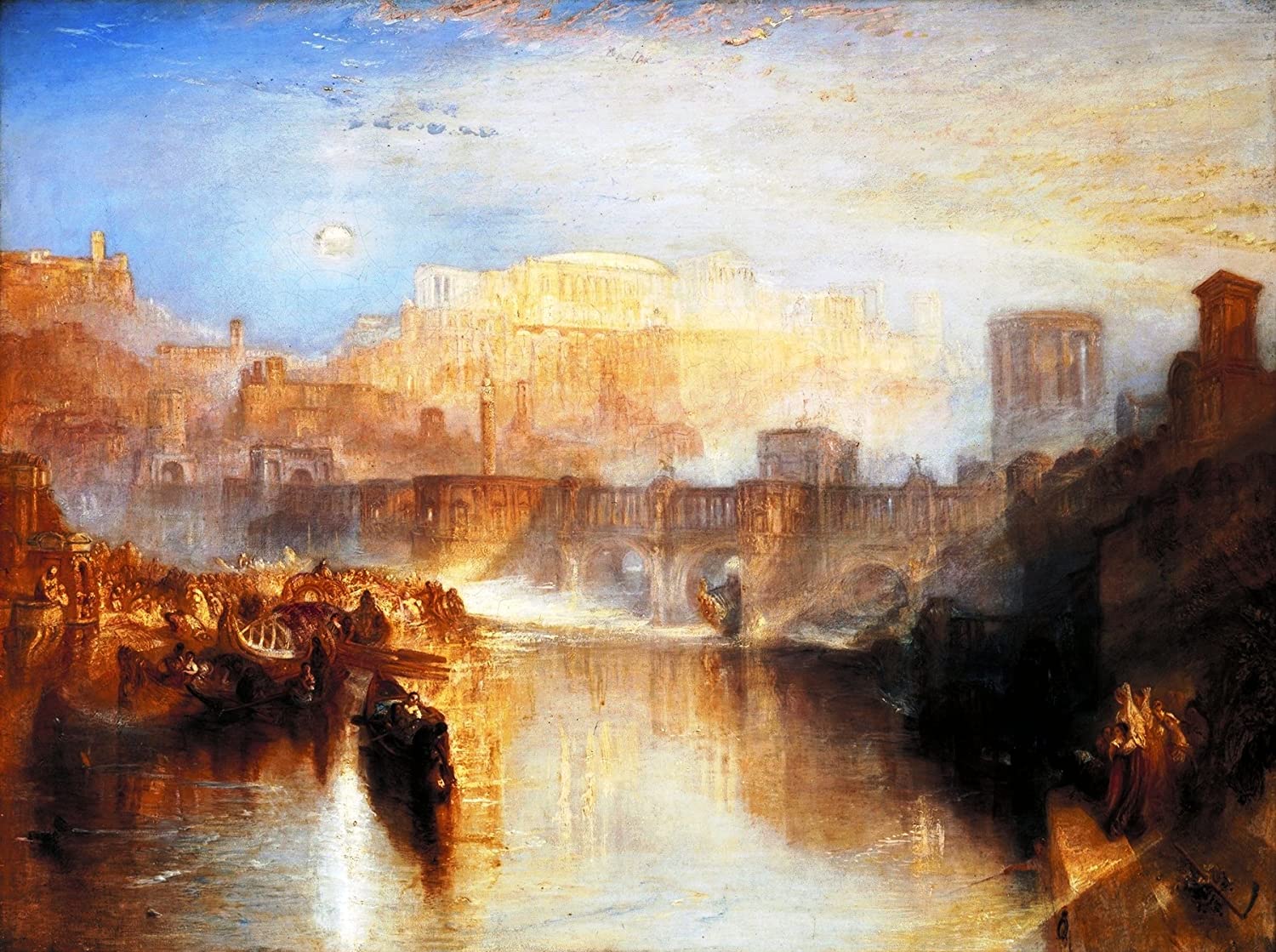
Long before her boat docked at the port of Brundisium in the winter of 19 CE, Agrippina (the Elder—14 BCE- 33 CE) might have known that the mourners would come out. Like the perfectly choreographed event many believe it was, people were packed on the waterfront elbow to elbow, some standing for days others for hours; they lined the city walls, with the boldest of them perched onto unstable rooftops—all to catch a glimpse of her. Adored and admired—she was the Roman darling. “The glory of a nation, they called her, the lone survivor of Augustus’ bloodline” writes Tacitus in his Annals. Agrippina was the daughter of Augustus’s (63 BCE-14 CE) only biological child, Julia, who had died in exile when Agrippina was a mere twelve years old. Although she once had four siblings, Agrippina, was considered the sole biological grandchild of the Divine Augustus—Augustus was so popular as emperor that upon his death he was deified. Her brothers were all dead at or before the tender age of twenty-five and her only sister, Julia, was in punitive exile from which she would never return. But on this day, Agrippina was more than just the progeny of a god; one half the golden couple, she was also the newly minted widow of Rome’s heir-apparent and one of the most celebrated of her generals—Germanicus Julius Caesar (15 BCE-19 CE). Biological nephew and adopted son of the ever-unpopular Emperor Tiberius (42 BCE-37 CE), Germanicus, was the hope of a nation and scion of the Julio-Claudian dynasty whose charisma off the battlefield and his multiple successes on it compared him to another beloved war-hero, Alexander the Great, who also died too young at thirty-three years of age.
The image of a grieving nation, an emaciated and pale Agrippina made her way across the gangplank with two of her six children in tow carrying the ashes from her freshly deceased husband when a collective wail descended from the crowd. Indistinguishable one from the other, men were crying, women were keening, strangers to Germanicus wept as fervently as his friends. In a boundless display of communal grief the people tore at their hair, pounded their chests, and howled for the world to hear—their golden prince was dead. But the mourning did not stop at Brundisium, it had only just begun. The tribunes and centurions of two praetorian cohorts greeted Agrippina lifting Germanicus’s urn onto their shoulders while the funeral procession marched across the Italian peninsula stopping at designated towns along the way. In a grand display of public bereavement grieving Romans dressed according to their station; plebeians wore black, knights dressed in vibrant purple and those in the upper stations wore dark togas. Coming from far and wide to pay respects to their fallen prince, the mourners streamed into the streets advancing their way to Rome where they were met by consuls and senators as well as Germanicus’s family members. Tiberius’s son, Drusus (14 BCE-23 CE), and Germanicus’s brother, Claudius (10 BCE-54 CE), and the rest of Agrippina’s and Germanicus’s six children took part in the nationwide funeral. But for all the solemn pomp and circumstance of Germanicus’s most public of funerals, one luminary was conspicuous in his absence, Germanicus’s biological uncle and adopted father: the Emperor Tiberius or as he preferred to be called the Princeps (first citizen). It was no secret that the relationship between the two men of contrasting dispositions was oftentimes strained.
Germanicus, great-nephew and a favorite of the Divine Augustus was designated in Augustus’s will as Tiberius’s successor. In fact, Augustus initially wanted Germanicus to be his immediate successor but was persuaded into choosing Tiberius by his wife, the ever-controlling Livia. Because Augustus had no sons, as part of the succession arrangement, Augustus had adopted his stepson, Tiberius, with the stipulation that Tiberius adopt Germanicus. Even though Tiberius’s son, Drusus, was only one year younger than Germanicus, the proviso was that Germanicus be next in line of succession. Aloof and ill-at-ease, the perennially unpopular Tiberius was uncomfortable in his role as emperor and saw Germanicus’s rising fame on and off the battlefield as a threat to his staid governance. Forasmuch as Tiberius was apprehensive with Germanicus’s military victories, he was even more so with Agrippina’s.
As a general rule, conventional Roman wives did not accompany their husbands on military expeditions. A staunch supporter of conservative values, Tiberius believed that Roman wives should stay home to demonstrate wifely virtues such as spinning and weaving, much as his mother Livia reportedly did. But Julio women were not known for their propriety. To be sure, Agrippina’s plucky mother, Julia, had accompanied her husband—the brilliant General Marcus Agrippa—on his military excursions; it was on such an expedition that Agrippina was born. Insisting on accompanying her husband during a dangerous military exercise against mutinous forces in the Rhine, Agrippina appeared in the thick of things in 14 CE, along with their toddler son, Gaius Julius Caesar Germanicus—affectionately dubbed “Caligula” by the soldiers for sporting miniature soldier’s boots caligae.
Unhappy with the tight-fisted Tiberius for keeping them at war while not raising their wages, the malcontents wanted a change in governance. Reports from the field became increasingly alarming. In an attempt to quell the uprising, interceding senators had themselves became accosted. Even the popular Germanicus was unable to calm the mutinous soldiers. At a tense moment in the campaign, Germanicus insisted that Agrippina, along with tiny Caligula, withdraw from the skirmish. Initially she would have none of it. The word ‘retreat’ was not nor ever had been in her lexicon. After all, as progeny from the Divine Augustus, danger was not something Agrippina had ever shirked. Much back and forth between the couple ensued with Agrippina ultimately acquiescing. But the sight of their adored princess and her young son escaping from the very soldiers who were supposed to be defending them, rebuked the mutineers as nothing else had. Shamed and crestfallen, the soldiers finally capitulated. Where military might and the state’s authority had failed, the mere presence of Agrippina had prevailed.
Yet again, her military mettle was challenged the following year when she accompanied Germanicus into the Rhine. Germanicus and some of his troops were in pursuit of a German chieftain in an area beyond the Rhine while a pregnant Agrippina stayed behind with the rest of the forces. When a rumor came out that the Romans were surrounded by Germans whose objective was to cross the Rhine river into the Gaulish provinces, the soldiers’ knee-jerk reaction was to dismantle the bridge as a means of cutting off the Germans. But tearing down the bridge would have led to certain disaster as Germanicus and some forces were still on its other side. Amidst the chaos and threat of warfare, Agrippina kept her head. As a means of circumventing the destruction of the bridge—armed with ingenuity and the steel will that was her birthright—Agrippina established herself at the foot of the bridge and distributed food and clothing to the returning soldiers. Looking for all the world like the sovereign she was, she greeted each soldier personally and thanked them for their service while they crossed the bridge she alone had saved.
If the people adored her before the military victories, they worshipped her after them. Across the Roman Empire, statues of Agrippina went up in her honor. Even Tacitus calls her “a woman of great spirit,” high praise from the historian. But news of Agrippina’s intervention on the battlefield was not well-received by Tiberius. While he believed the presence of a woman on the field feminized the valor of the soldiers, more importantly he was concerned that Agrippina’s rising popularity exceeded that of his commanders and that she had sidestepped their essential role. But the truth is, if it were left to the commanding officers, the bridge would surely have been demolished spelling certain defeat for Germanicus and his mission. Notwithstanding her bravery in the field, the relations between Tiberius and Agrippina had always been tense.
At this point, it is worth noting that Tiberius was Agrippina’s stepfather as well as her adopted father in law. In the merry-go-round of arranged Julio-Claudian marriages, the ever-dour Tiberius—Livia’s first born from her marriage to Tiberius Claudius Nero—was ill-fatedly wed to the bon vivant, Julia, Augustus’s only biological child. Alas, theirs was not destined to be a happy union. Raised as brother and sister, the two had long disdained each other. After their only son died in infancy, Tiberius—much to the bewilderment of Augustus—“retired from Roman politics” and moved to the island of Rhodes, a full fourteen hundred miles away from Rome. Never one to let grass grow under her feet, Julia was subsequently accused of adultery and ultimately exiled by her father to the barren and windswept island of Pandateria. After Augustus’s death, as emperor, Tiberius cut off her food provisions while Julia slowly starved to death. Some believe he did it at the instigation of his mother, Livia, whose hatred for Julia was legendary. Nevertheless, one can only imagine the animus Agrippina must have felt for the man responsible for her mother’s cruel death.
Regardless of Agrippina’s troubled relationship with the Princeps, after the victories on the Rhine, Rome welcomed the conquering hero with a triumph ostensibly designed to showcase Germanicus’s ever-burgeoning young family. Much to Tiberius’s deep disdain, spectacle is what the golden couple did best and the people adored them for it. One cold heartbeat away from becoming the first family, Romans—from all walks of life—eagerly streamed into the city streets to have a look at the celebrity couple and their children. Beside their parents in the chariot, the children were in chronological order: Nero, Drusus, Agrippina and Drusilla. But the public’s favorite was seated next to his father—four-year old Caligula. The crowd went into spasms of delight at the sight of Rome’s little darling outfitted as a tiny soldier sporting his signature soldier’s boots—Agrippina dressed him for maximum effect. Who would guess that in just over two years, the memory of this happy family welcomed by celebrating Romans, would be transformed into one of grief and mourning?
A short while later—at the zenith of Germanicus’s popularity—Tiberius saw fit to send his heir designate away from Rome and into the eastern provinces under the proviso of breaking the client-king systems; that is to say transforming ancient kingdoms into provinces. Accompanied by the ever-expectant Agrippina and their favorite, Caligula, the almost-first family took in the culture of Athens visiting ancient sites along the way, while Agrippina gave birth to their last child, Julia Livilla, on the island of Lesbos. As a commander of the eastern provinces, Germanicus had the authority of an emperor, but it may not have been a coincidence that at the time that Germanicus was sent to head the east, a new governor was installed in Syria who many believe was deployed by Tiberius for the express purpose of spying on his heir apparent. A lifelong friend of the Tiberius’s, Gnaeus Calpurnius Piso came from a distinguished Roman family with strong ties to the Claudian line. Further, his wife, Munatia Plancina, was one of Livia’s closest confidants. But the close family connection did nothing to endear the two men or their wives to each other. Even before they met, Piso seemed determined to dislike Germanicus, hurling insults at him for visiting Athens and calling the Greeks “a decadent race.” Perhaps history would have taken a different course but for the benevolence of the golden prince. When Piso’s flotilla was overcome by a whirling tempest, Germanicus generously sent out a party to save the governor. It might seem rational to suppose that saving his life would improve Piso’s combative disposition toward Germanicus, but such was not the case. If anything, he grew still more pugnacious. But things went from bad to worse when Germanicus returned to Syria from an excursion in Egypt only to discover that Piso had cancelled all the orders he had made before his trip. Furious at the gross insubordination, Germanicus and the governor quarreled heatedly with Piso departing in “open enmity,” reports Tacitus. Soon after, Germanicus fell ill. From the outset he was convinced that Piso and his wife had poisoned him. He wrote letters to his friends telling them of his suspicions and calling for revenge. Upon news of Germanicus’s untimely death, in wild jubilation Piso and Plancina threw open the temples for celebration, flagrantly rejoicing his death while making it seem to all the world how likely they were mixed up in it.
Meanwhile, Agrippina’s world was in ruins. Suddenly her status changed from empress in waiting to private Roman matron. Deemed “impatient for equality,” as a Roman female Agrippina could never be empress in her own right—yet she was weaned for regency. According to Tacitus, a dying Germanicus begged Agrippina “to set aside her pride,” not anger anyone by competing for power and warned her “of the threat caused by Tiberius.” Still, being the progeny of a deity does not lend itself easily to humility. Beloved by the people, as the sole living grandchild of the Divine Augustus, Agrippina had no intention of going gently into the night. After all, her children were the future and the hope of a nation. Worn out and devastated by the loss of her husband—yet unwilling to lose any time—a steadfast Agrippina set sail for Rome on the wintry seas in January 19, with two missions in mind: retribution for Piso and his wife and securing a place on the throne for her sons. By staging a funeral fit for a king she was influencing public sentiment against his murderers while at the same time laying the groundwork for her sons to be in line for succession.
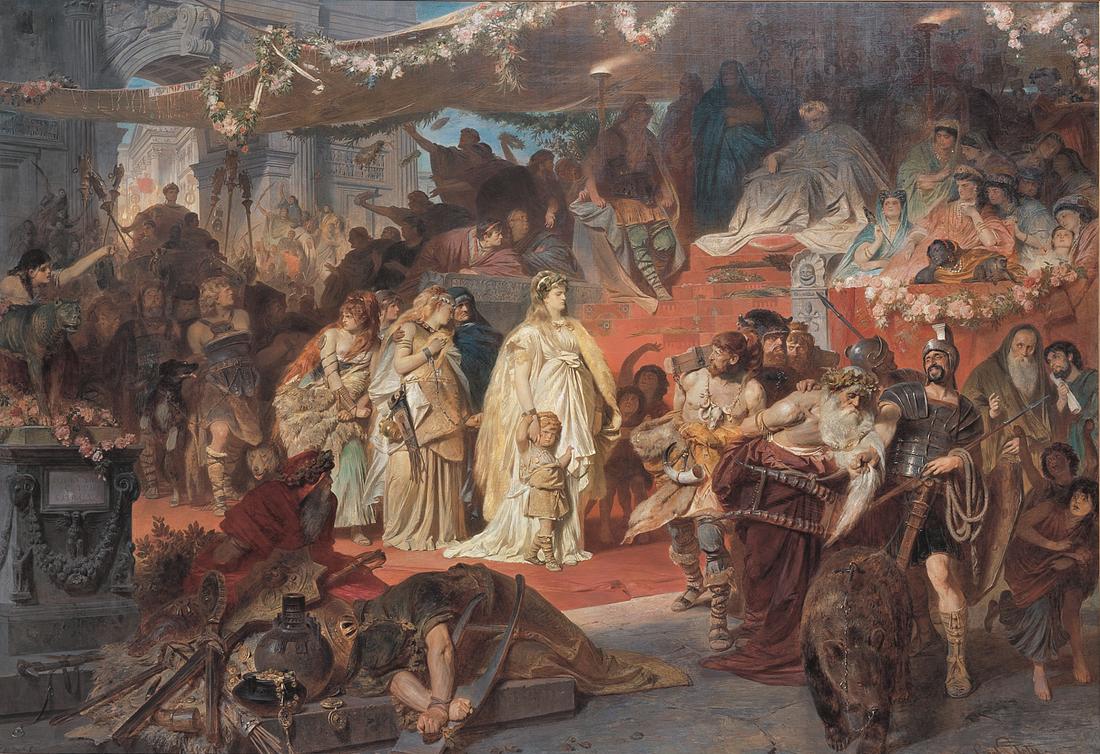
Even before the funeral march, Roman tongues were wagging. By their close association with Piso and Plancina, people were convinced that Tiberius and Livia were involved in the poisoning of the heir apparent. Why had Tiberius sent Germanicus to the east just as he was installing Piso as governor of Syria? Further, why were Livia and Plancina always meeting behind closed doors? Although Livia was notorious for being intransigent, was she wicked enough to kill her own grandson? After all, Germanicus was the son of her second born, Drusus, who had also died young and was beloved by the people. Tacitus claims that Germanicus, like his father before him, had republican instincts and would have “restored liberty to the people” had he became emperor. If that were the case, it may not be difficult to understand why the emperor and (Julia) Augusta (an honorarium bestowed on Livia after Augustus’s passing) would have sought to quell Germanicus’s reign.
In his characteristic indifference, Tiberius did nothing to assuage the people’s fears that he was behind Germanicus’s untimely death. In fact, his behavior stoked them. To the people, Tiberius’s absence from Germanicus’s funeral was not only an affront to Germanicus’s memory but more importantly testament to the Princeps’ culpability for his murder as well. Making matters worse, at Germanicus’s burial, people took it as a slight that Tiberius—in his hallmark frugality—conferred too few honors on the fallen prince. Tone-deaf as ever, Tiberius was impatient with the commemorations and displayed his petulance with the inconsolable mourners by urging them to get back to work. In their sorrow and fury, public outcry was reaching a fever pitch; the people had been robbed of their prince and would not be silenced. Tacitus remarks that it would have gotten out of control had Tiberius not summoned—however reluctantly—Piso and Plancina to Rome. Upon trial, Tiberius was hesitant to reach a decision about his friends. Never mind that they may have been responsible for killing his heir and adopted son or short of that—gross insubordination, the reluctant Princeps deferred the case to the servile Senate. Meanwhile, further widening the breach between Agrippina and Livia, the most reverend Augusta intervened on Plancina’s behalf to have her pardoned. Livia’s bosom buddy took full advantage of her amnesty and abandoned her husband to his fate. Yet not even the most reverend Augusta had the temerity to come to Piso’s rescue. Manic in their frenzy, the crowds were out for blood. Statues of Piso were toppled and smashed on the Gemonian Steps—where bodies of the condemned were tossed —while all over town posters began appearing which cried “Give Us Back Germanicus.” The writing was on the wall, Piso’s fate was sealed. Beating them to it, he took his own life.
Eventually, a certain détente had settled between Tiberius and Agrippina. Because her children were too young to rule, she was resigned to Tiberius’s son, Drusus as successor. In 23 CE, Tiberius was sixty-five years old and looking forward to handing the reigns over to his son one day. But in characteristic Julio-Claudian fashion, at thirty-seven, Drusus died after a brief illness. Then within the year, one of his twin sons, Germanicus the Younger—at a tender four years of age—rushed to join his deceased Julio-Claudian forebears. Alas, poor Tiberius, his successors—like those of Augustus—found it difficult to succeed him. His plans shattered, a devastated Tiberius—stoic as ever—went before the Senate adopting Agrippina’s two eldest sons, Nero Caesar and Drusus Caesar: ‘Adopt and guide these young men—these offspring of an incomparable bloodline.’ Tiberius had planned for Drusus to act as mentor to the boys, truth being that Tiberius had neither the energy nor the enthusiasm for the endeavor. A loner by nature with few friends and confidants, Drusus’s loss set up a vacuum which was filled by an ambitious praetorian prefect whose aspirations far exceeded his station. Lucius Aelius Sejanus had been a favorite of Tiberius’s before Drusus died but afterwards his counsel became increasingly indispensable to the emperor. Tiberius once referred to Sejanus as socius labroum “my partner in my toil.” Yet, Sejanus longed to be more than just a partner to the Princeps; his ambitions included elevation to the throne itself—to the detriment of Agrippina and her two eldest sons.
It began slowly at first. Sejanus—Iago-like—began a whisper campaign against Agrippina. With relations between Agrippina and the Princeps tepid in the best of times, it proved easy to do. First, he suggested to Tiberius that the domineering and haughty Agrippina was over-stepping in asking the priests to offer vows for the safety of her two eldest sons right alongside those for Tiberius. The effrontery of that woman! Even though the priests denied that she did so, Tiberius cautioned the Senate to take the boys down a peg in their self-importance. Then even more destructively, Sejanus whispered to the emperor that a “faction of Agrippina” was threatening to divide the Roman state by civil war. Although today most question the veracity of this claim, the truth is if anyone could raise an army against Tiberius, it would be Agrippina. Ever-paranoid about his rule, Tiberius began to tighten the noose around her inner circle. In 24 CE, Gaius Silius and his wife Sosia Galla were arrested. Besides being guilty of having been close friends with Germanicus and Agrippina during their time in Germany, perhaps indiscreetly, Silius had bragged that if his forces had mutinied along with the others on the Rhine they would surely have overthrown Tiberius. With the cards stacked against him, Silius eventually committed suicide and Sosia went into exile. Then in 26 CE, Agrippina’s cousin and confidant, Claudia Pulchra, was accused of plotting against Tiberius. As with the charges against Silius and Sosia, there is no way of knowing if the accusations had any semblance of truth to them. Regardless, Agrippina’s name was sullied by association just the same, which Tacitus believes was the primary motive for the claims. Shortly thereafter, Agrippina confronted Tiberius when she found him sacrificing at the altar of Augustus. Infuriated, she raged at the hypocrisy of his praying to Augustus while he persecuted Augustus’s progeny especially as she was “the true image” of Augustus, “a descendent of his heavenly blood.” Dismissive as ever, Tiberius quoted a Greek verse: “Because she did not rule did not mean she was being mistreated.” Characteristically, he ignored her grievance on the one hand, but on the other hand—more ominously—the quote revealed his fears about her thwarted desire to rule. According to Suetonius, Tiberius was never to speak with her again.

In her late thirties by now, Agrippina sought to remarry. Tacitus cites from Agrippina the Younger’s journal (now lost) how her mother requested permission from Tiberius to re-marry. A Roman widow—even a woman as powerful as Agrippina—had to get consent from the senior male in her family for something as fundamental to her life as remarriage. The fact is, even by herself Agrippina was a political threat to Tiberius. But she was doubly so with a husband by her side. Tiberius could not risk her remarrying but instead of flatly denying her, he chose the cowardly way out. He ignored her plea altogether. Ever paranoid and cruel, under the “guidance” of Sejanus, Tiberius was becoming even more so. Relentless in his scheme to derail Agrippina, Sejanus infiltrated Agrippina’s inner circle of friends and spread a rumor amongst them that the Princeps was planning on poisoning her at the dinner table. Believing Tiberius capable of it, Agrippina refused to eat anything at his table. Initially stung, Tiberius then used her suspicion of him as justification for his severity with her. The noose was steadily tightening. In 26 CE, Tiberius, desperate for a reprieve from governance, moved to Capri—nearly permanently—leaving Sejanus in charge of everyday governance.
As acting emperor and prefect, Sejanus had the all-important Praetorian Guard at his disposal. Initially the Praetorian Guard was formed by Augustus for the personal security of the emperor, but as a result of its power, it acquired a reputation for political intrigue. Indubitably, plots against his progeny were not something that Augustus envisioned when he first established the guard. At the Prefect’s behest, his officers spied on Agrippina and her son Nero. After taking copious notes of everything said and done in her household, nothing exceptional was found. But that did not stop the onslaught. Masquerading as friends, Sejanus’s operatives urged Agrippina and her son to move to Germany. Although their response is not known, Sejanus circulated the rumor that they were considering it. Make no mistake, in his smear campaigns Sejanus never needed proof to damage credibility. Finally, in 28 CE, another close friend of Germanicus’s was accused of treason. In a bogus trap, Titius Sabinus, a distinguished knight, had what he thought was an innocent enough conversation with one of his friends, Latiaris, who had been briefed beforehand by Sejanus. As instructed, Latiaris began by praising Germanicus then expressed sympathy for his widow. Unlucky Sabinus walked right into it, agreeing with Latiaris’s statements then went one step further by denouncing both Sejanus and even the noble Emperor himself. Naturally, Sabinus’s time on the planet would be coming to an abrupt end. About this period, Tacitus writes: “Never had the city known greater tension and paranoia.” In an increasing climate of distrust and fear, Sejanus ruled by rumor and conjecture pitting friends and family members one against the other. “People were tight-lipped even with their closest relatives,” records Tacitus. After Sabinus was most cruelly dispatched into the hereafter, Tiberius sent a letter to the Senate thanking them for punishing Sabinus then made reference to various threats to his life and the state aimed obliquely at both Agrippina and Nero.
Agrippina might have been hard pressed to believe that the only person saving her and her two eldest sons from a tragic fate was one of the darkest forces in her life. But even Livia’s blood was thicker than water and Agrippina’s children were her great-grandchildren, after all. When Livia passed in 29 CE, the gloves came off. No sooner had her cold, hard body been relegated to the funeral pyre—yet another funeral her son, the Princeps chose not to attend—then a letter materialized as if from the heavens. Written by Tiberius and sent to the Senate, the letter accused Nero Caesar of obscenity and homosexuality. Accusations of sexual transgressions were impossible to prove or disprove—which was a big reason they were so effective in smear campaigns. Besides besmirching Nero, the letter denounced Agrippina as arrogant and insubordinate—no breach too petty for retribution by the Princeps. Meanwhile, in the Curia, the people made themselves heard. In support of Germanicus’s revered widow and his son they held effigies of them while condemning the letter as a forgery. Edgy at the growing crowds, the cringing Senate was confused. Was it a hoax? Why would Tiberius denounce his own family members? Even if it were real, the Senate was unsure what they were supposed to do with it. So they took a page out of Tiberius’s playbook and ignored the letter altogether. Furious that his letter had been disregarded the Princeps then wrote a more severe letter to the Senate that was unequivocal in its wrath against his daughter-in-law and heir apparent. Back on track, the Senate condemned both Agrippina and her son as co-conspirators then denounced Nero as an enemy of the state. Groveling, the Senate asked the most august emperor if these atrocious offenders should be put to death. But Tiberius had other plans. The granddaughter and great-grandson of the Divine Augustus were bound, shackled and put under heavy guard for transfer to two separate prison islands off the Tyrrhenian Sea. In a sinister nod to the past, Tiberius sent Agrippina to Pandateria, the island where her mother, the ebullient Julia was confined before eventually starving to death. Again, the people took to the streets in protest. Never one to take the public’s opinion to heart, Tiberius did what he did best—he ignored them.
Shortly thereafter, orchestrated yet again by the Prefect, Agrippina’s second son, Drusus, was condemned by the Senate on trumped up charges and confined to a dungeon on the Palatine—where he would ultimately die when food was withheld. Meanwhile, in 31 CE, his older brother, Nero, was either executed or died of starvation while in confinement on the penal island of Pontia. The two heir apparents thus dispatched, must have sent Sejanus jumping for joy. Clearing the path for himself, he had effectively removed both obstacles in the way of succession. Only Rome’s darling, Caligula, was left. Living on an island retreat with his grandfather and adopted father—the Princeps—a teenaged Caligula was as yet a difficult target for even a talented marksman like Sejanus to pursue. Alas, the Prefect had to remain content with those whose lives he could more readily destroy.
By this time, Sejanus’s power had been steadily growing. Honors, decorations and even a consulship were stacking up for him, all over Rome statues were turning up depicting the ever-obedient Prefect by the Princeps’ side. Forasmuch as Sejanus’s influence appeared to be waxing in Rome, hidden away in his island cave, Tiberius’s influence appeared to be on the wane. In Lives of the Twelve Caesars, Suetonius reports that after Agrippina and her two eldest sons were condemned, Tiberius lived at such a heightened state of paranoia that “he never removed to any place but in fetters and in a covered litter, closely attended by soldiers.” But paranoid and apprehensive as Tiberius may have been, he was still emperor. Once Agrippina and her two eldest sons were out of the dynastic picture, Tiberius took a harder and closer look at his “partner in toil.” Perhaps Suetonius was correct when he claimed that Tiberius may have used the Prefect all along in order to remove Agrippina’s two eldest sons thus paving the way open for his grandson Tiberius Gemellus for dynastic succession. Others believe that it was a letter penned by Antonia the Younger, the mother of Livilla (widow of Drusus)—with whom Sejanus had long been enamored—that awakened Tiberius to the devious machinations of the Prefect. To Tiberius’s horror, Antonia’s letter even implicated Sejanus (and Livilia) in his son’s Drusus’s sudden passing.
Now that the lidded eyes of the Princeps were finally open, the trap was easily set for his ensnarer in chief. In addition to all the other powers conferred on him over the years, Sejanus was led to believe that he was being awarded the all-important tribunician power—a sure sign that he would be heir-designate. Hotly anticipated, he eagerly swallowed the bait. Sejanus arrived at the Senate chamber amid much fanfare from the toadies and sycophants he had long cultivated there. But it did not take long before things began to go amiss. Read on the Senate floor was a letter from Tiberius that became increasingly incendiary toward his Prefect. Far from Sejanus receiving the tribunician power, at long last, he was now on the receiving end of one heinous accusation after another. But this time the charges were all true! Finally, the punishment his nefarious activities had so long meted out to others was to be dropped on him. His so-called supporters, who had fawningly rushed to his side only a few minutes earlier now scurried away like mice making room for the magistrates to arrest the most august Prefect. The end came swiftly. Sejanus was executed the following day. His lifeless body thrown unceremoniously onto the Gemonian Steps where for three days it was abused and pummeled by those who had long despised him—just about everyone living in Rome. More closely resembling something amphibious than anything human, his remains were finally hurled into the Tiber, a burial reserved for only the most heinous and despicable of criminals. At last, he had found his true station.
If Agrippina had hoped that the downfall of Sejanus would help her dire situation, she would be most cruelly disappointed. In contrast, after Sejanus shuffled off this mortal coil Tiberius became even more vocal and antagonistic against Agrippina and her two eldest sons. Unfamiliar with the notion of clemency, the small minded, tight-fisted Princeps held fast to his petty grudges and grievances. Even the subsequent deaths of his adopted sons were not enough to calm down his ire. Long past the point of defending themselves, Tiberius heatedly denigrated the young men by repeating the spurious allegations used against them and further ridiculed his imprisoned daughter-in-law. By then she had lived on the windswept and barren island of Pandateria for a few years—never known for her forbearance—Agrippina was increasingly vocal about the grievous conditions there. In retribution for her ire, Tiberius ordered a centurion to beat her so brutally she lost an eye. Defiant until the end, Agrippina vowed to starve to death, but Tiberius had her force fed instead. Finally, at forty-seven years of age, on October 18 in 33 CE, two years to the date that Sejanus was executed, the granddaughter of the Divine Augustus perished. Priding himself on his leniency, Tiberius boasted to all and many how—but for his clemency—he could have had his stepdaughter and adopted daughter-in-law strangled or tossed on the Gemonian Steps. Telling tales about her unpleasantness, he then declared the anniversary of her (and Sejanus’s) death as a national holiday and ordered an annual sacrifice be made to Jupiter each year in observance. But Agrippina may have had the last laugh.
In a fitting denouement, Caligula is believed to have murdered the Princeps in 37 CE. By this time, Tiberius was in his seventy-eighth year and had served as emperor for twenty-three long, hard and arduous years. Unsurprisingly, his death was greeted amid much fanfare amongst the Romans who were not only celebrating the death of their dour and utterly unlikeable emperor, but also reveling in the return of their long-lost hero, Germanicus, in the guise of his only surviving son. Although Tiberius did everything to prevent it, he was succeeded by of one of Agrippina’s sons, after all. In spite of the fact that his golden family was in tatters—or perhaps because of it—the people loved Caligula for no other reason than being the personification of their long-lost golden couple. Once he ascended the throne, Caligula capitalized on the public’s nostalgia for his family and made Agrippina the star in his campaign to restore them. With coins and statuary crafted in Agrippina’s image, the granddaughter of the Divine Augustus and mother to the extant emperor was made the centerpiece of the Julia-Claudian dynasty. Eventually, her legacy would span generations and include two emperors (a son and a grandson) and a daughter—”impatient for equality” like her mother—who was the driving force behind the reigns of her emperor husband (Claudius) and her emperor son (Nero). For centuries, Agrippina’s indelible image of strength and fortitude could be found throughout the empire, rendering her as famous in death as she had been in her abbreviated life.
As Published in the May 2020 Classical Wisdom Magazine

